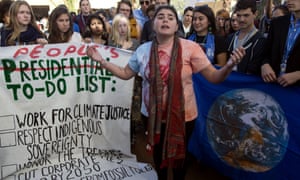Extract from The Guardian
Donald Trump’s scepticism about climate change makes it vital that
the case for better planning and preparation is articulated in a
politically astute way


Donald Trump’s inauguration as US president poses a grave threat to the major progress made in the battle against climate change over the past decade. The top 20 things that Trump has pledged to “get rid of” include US commitment to the Paris climate agreement and payments to the UN climate fund, which helps developing countries tackle global warming.
Those working to help poorer states adapt to the impact of climate change and become more resilient to its effects must emulate the approach adopted by the global green movement, which is preparing to fight its corner in the struggle to limit the concentration of greenhouse gases in the atmosphere.
Apart from activism and political organisation, people working to develop resilience programmes and policies need to frame and communicate the benefits of their work in a way that aligns with the priorities of the new regime. There are five things they can do to counter the looming existential threat posed by Trump if they become more savvy political operators.
First, since migration was central to Trump’s candidature, it is vital to stress that helping communities to prepare for the disruption wrought by global warming – not least by adapting their present habits – will curb the involuntary movement of people. Fewer climate refugees will mean less displacement and a reduction in the number of people crossing borders. In 2008, disputed research by Professor Norman Myers, a British environmentalist, put the number of climate change refugees at 20 million and suggested the number could swell to 200 million by 2050, causing substantial displacement in the US and beyond. It is therefore vital Trump is made aware that helping people in vulnerable areas to roll with the punches – an approach that has proved effective in Africa, Asia and the Americas, as the International Organisation for Migration has pointed out – could help reduce these numbers.
Another of Trump’s main planks is economic growth. The centrepiece of his economic plan is the promise to create 25m jobs over the next decade. With that in mind, it is crucial to emphasise that preparing for natural disasters and reducing the risk of them happening in the first place can help to boost economic growth. A World Bank report has argued that such measures “can have immediate and significant economic benefits to households, the private sector and, more broadly, at the macroeconomic level”, noting that the perception of risk from future disasters leads to risk aversion that dampens entrepreneurial activity.
Conversely, adequate measures to reduce risk through resilience programmes and policies can promote investment. For example, government investment in flood defences in Mexico’s Tabasco region has helped stimulate private investment in housing and stopped companies from leaving. The Rockefeller Foundation has chronicled numerous instances from the US, New Zealand, Colombia and India to argue that equipping communities to deal with natural disasters yields a tangible dividend.
A third area in which those focused on fostering a stronger ability to absorb natural shocks might make headway with Trump relates to peace and security. Trump pitched himself as the “national security” candidate, so it would be useful to demonstrate that greater resilience equates to greater safety. Last year, 25 US military and national security experts, including former advisers to Ronald Reagan and George W Bush, warned that climate change poses a “significant risk to US national security” (pdf), for instance by causing food shortages that can foment public unease and create a breeding ground for terrorism. Similarly, the Overseas Development Institute claims that the relationship between conflict and disasters is complex but cites examples from Afghanistan, Uganda and Nepal to demonstrate that mitigating the impact of climate change can reduce the risk of conflict.
At the same time, there is no need to raise the hackles of the incoming regime by basing the case for resilience solely on global warming. Instead, a fourth strategy would be to frame resilience as an approach that also helps to deal with technological, social, economic and political shocks. Why not point out to Trump that helping vulnerable communities acquire risk insurance, savings and stocks of emergency rations and medicine can help them deal with political unrest and industrial disasters as well as earthquakes, floods and cyclones?
Finally, it is vital to talk about the here and now. Climate sceptics deride talk of global warming for privileging abstract future concerns over issues that matter today. This is partly because scientific analysis has used models and forecasts to predict future impacts. Yet natural disasters and other effects of climate change are already eroding 1.6% from global GDP, leading to the involuntary migration of millions of people and exacerbating the risk of conflict and national security threats. These issues are likelier to strike a chord with Trump than scientifically sound projections and predictions.
There is an urgent need to maintain the positive momentum on battling climate change. A politically astute approach by the resilience movement can help to achieve that.
• Dr Aditya V Bahadur works with the action on climate today programme at Oxford Policy Management and with the risk and resilience programme of the Overseas Development Institute
No comments:
Post a Comment